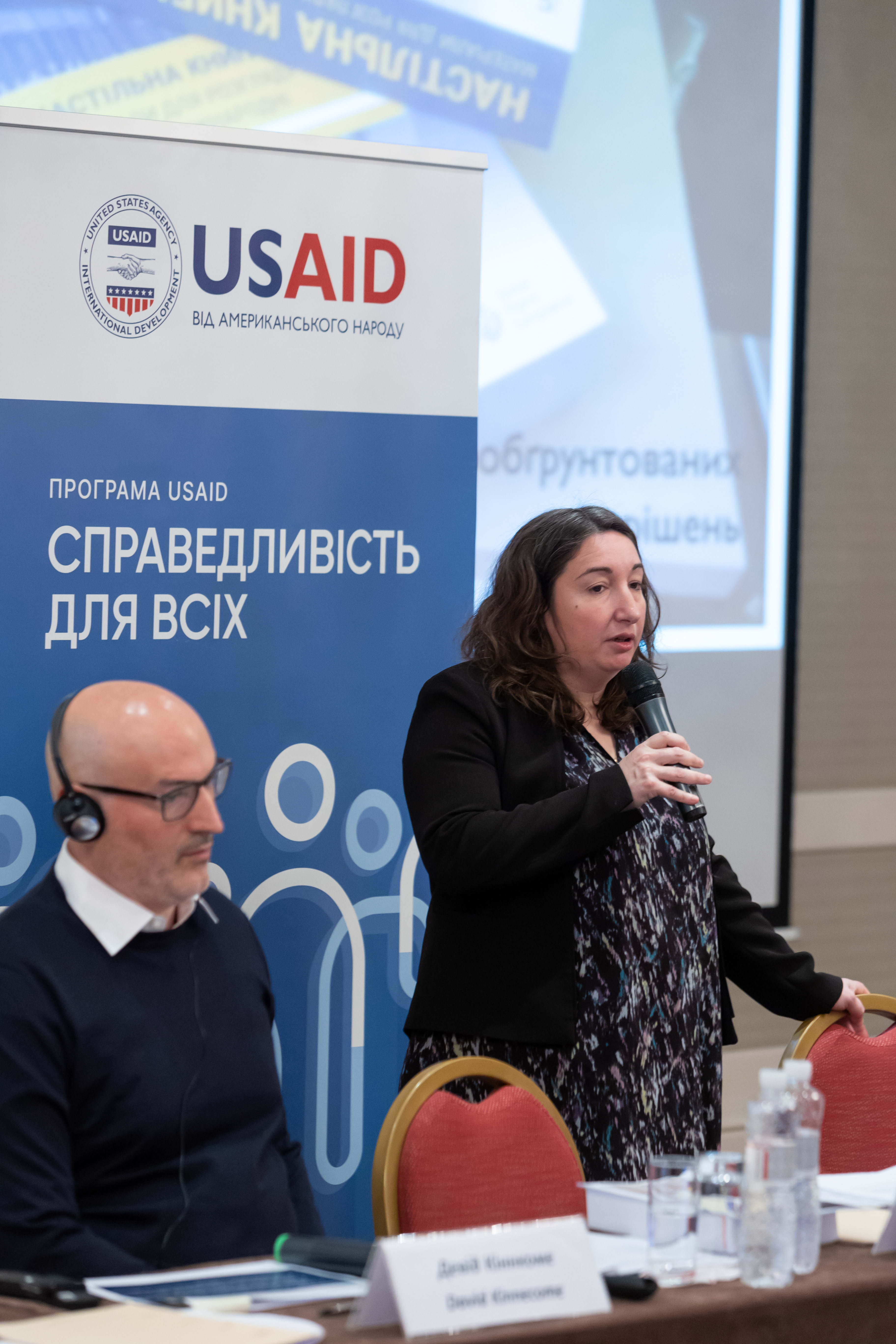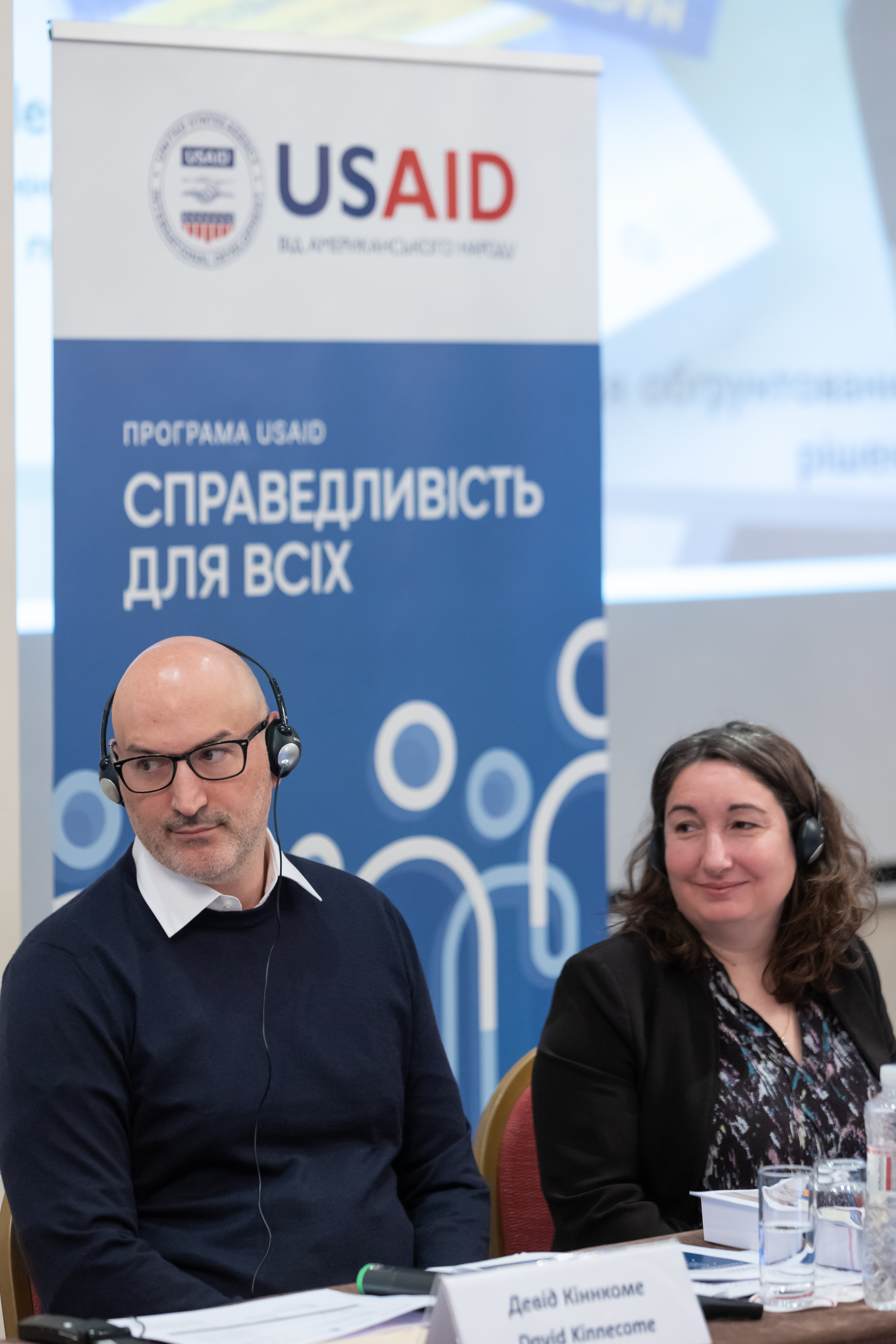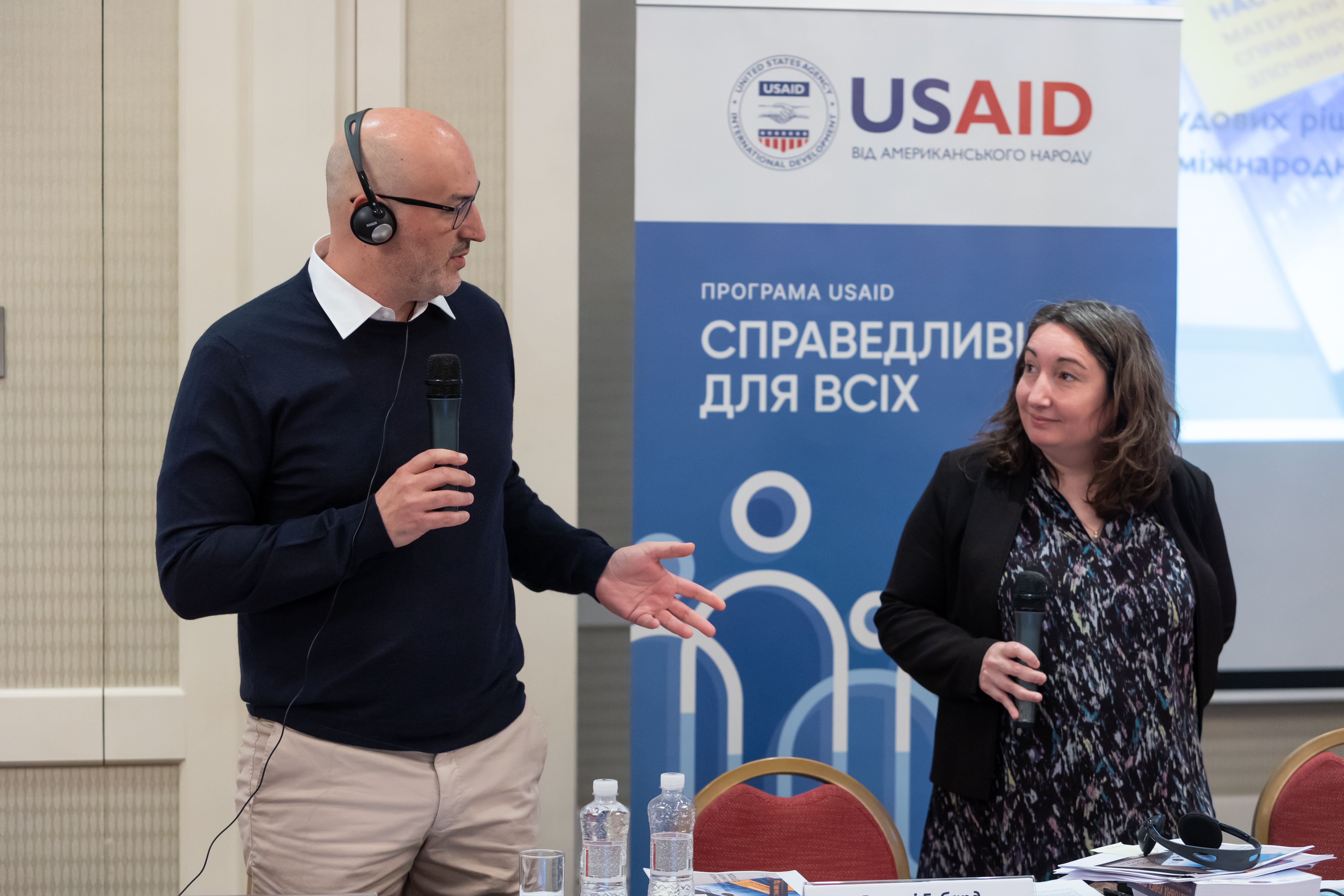From April 15 to 19, 2024, Uprights’ Valérie Gabard and David Kinnecome contributed as experts in a training for judges on the adjudication of international crimes in Ukraine and on judgment drafting in international crimes cases. The training was organized by the National School of Judges with the support from USAID Justice for All Activity, Global Rights Compliance and T.M.C. Asser Institute, which implements the Dutch-funded MATRA-Ukraine Project.

Alongside other experts specializing in international humanitarian law and international criminal law, as well as a judge from the International Criminal Court, UpRights’ Valérie Gabard and David Kinnecome shared their insights and subject matter expertise with participants.

During the training, 25 Ukrainian judges from throughout the country improved their knowledge, skills, and abilities in evaluating evidence in trials involving international crimes and applying international customary law in actual cases in Ukraine. Participants also discussed how to apply modes of liability to international crimes under the Criminal Code of Ukraine, and the importance of taking victim-centred, gender-sensitive, and child-sensitive approaches in adjudicating war crimes cases.

The program further included interactive sessions on how to draft well-reasoned judgments in international crimes cases. Experts shared with participants guidance on judgment drafting for the adjudication of war crimes cases in Ukraine based on international best practices, covering issues related to presenting evidence and factual findings related to the crimes prosecuted under Article 438 of the Criminal Code, as well as findings on legal elements of international crimes and modes of liability, defences.

The training built upon the Benchbook on the Adjudication of International Crimes under Ukrainian Domestic Law developed by international and Ukrainian experts in collaboration with judges and with support from the USAID Justice for All Activity. All training participants were provided with a printed copy of the Benchbook.

We are dedicated to supporting government entities and international organizations engaged in the complex task of prosecuting and adjudicating international crimes.
Our purpose is clear. We aim to build the capacity of legal systems and institutions to use international law to effectively pursue justice against perpetrators.
Our approach is multifaceted and adaptive. We engage in needs assessments, case-mapping, and research to tailor our support to the specific requirements of each partner and contribute to the design and coordination of legal strategies.
On 11 December 2023, Human Rights Activists (HRA) in Iran and UpRights filed a submission before the United Nations Fact-Finding Mission on the Islamic Republic of Iran (FFMI). The submission contends that crimes against humanity, and in particular persecution on political and gender grounds, have taken place in the Islamic Republic of Iran since at least 16 September 2022.
Analysing information collected and verified by HRA and two partner organizations, the submission demonstrates that there are reasonable grounds to believe that the crackdown by the Iranian authorities on the peaceful protests that followed the death of Mahsa Zhina Amini, and other violations related to the protests since September 2022, constitute a widespread and systematic attack against the civilian population. Against the background of the “Woman, Life, Freedom” protests, the submission highlights specific examples of the violence employed by the Iranian government including instances of arbitrary arrest and detention, sexual violence, and murder. It demonstrates that those examples qualify as underlying acts of crimes against humanity and severe deprivations of fundamental rights.
The submission outlines how agents of the Iranian government intended to discriminate against women and girls especially on the basis of gender, with these groups singled out for persecutory treatment including physical and psychological abuse, the use of derogatory language and acts of sexual violence including rape. The submission recognises in this respect that individuals have also been targeted on political grounds. It stresses, however, the intersectional nature of the violations to which women, girls and LGBTQI+ individuals have been specifically subjected by the Iranian authorities for their perceived non-compliance with established gender norms and discriminatory laws and policies.
The submission concludes with recommendations by HRA to the FFMI and the international community to establish accountability for the violations outlined in the submission.
UpRights thanks HRA for the opportunity to contribute to this important issue and in particular analysis of the crime against humanity of persecution on gender grounds. While the entirety of the submission has not been made public at this time, an executive summary of the facts is available here.
On July 18, 2023, UpRights Senior Legal Advisor David Kinnecome alongside Ukrainian judges led the fifth and final workshop focused on procedure in international crimes cases in Ukraine. The workshop is the final in a series of events organized by the USAID Justice for All Activity following the publication of the Benchbook on the Adjudication of International Crimes, which was developed by the USAID Justice for All Activity in partnership with the National School of Judges, Global Rights Compliance, and UpRights.
David and Ukrainian judges presented attendees with national and international perspectives on issues relating to trials in absentia, the assessment and admissibility of digital evidence, and the risks of re-victimization, which are relevant to adjudicating international crimes. In particular, the event highlighted how international practice and procedures can offer guidance and in certain instances persuasive authority when considering procedural issues under the Ukraine Criminal Procedure Code.
The event closed a series of thematic workshops organized following the publication of the Benchbook on 22 June 2023 to provide judges and other stakeholders with the opportunity to discuss substantial and procedural aspects of international crimes adjudication provided by the Benchbook.
On July 10, 2023, UpRights led the second workshop in the series of events organised by the USAID Justice for All Activity following the publication of the Benchbook on the Adjudication of International Crimes, developed by the USAID Justice for All Activity in partnership with the National School of Judges, Global Rights Compliance, and UpRights.
By focusing on the topic of war crimes, the workshop aimed to provide Ukrainian judges , prosecutors and other relevant stakeholders with the information necessary to adjudicate particular war crimes by presenting a list of the war crimes applicable under Article 438 of the CCU as well as their definition under international law.
The event is part of a series of five thematic workshops organized following the publication of the Benchbook on 22 June to provide judges and stakeholders with the context to discuss substantial and procedural aspects of the process of adjudication of international crimes outlined in the Benchbook.
On July 6th, 2023, the USAID Justice for All Activity started a series of a workshops on the applicability of international law instruments concerning war crimes under article 438 of the CCU with engagement of UpRights. It follows the recent launch of the Benchbook on the Adjudication of International Crimes under Ukrainian Domestic Law developed by the USAID Justice for All Activity in partnership with the National School of Judges and Global Rights Compliance, and with participation of UpRights initiative.
The workshop aims to facilitate discussions between Ukrainian judges, prosecutors and other relevant stakeholders in interpreting the scope and content of Article 438 of the CCU, considering the nature and content of international humanitarian law and international criminal law, in particular the ICC framework.
The event is the first in a series of five thematic workshops to follow the publication of the Benchbook on 22 June. The workshops provide the opportunity for judges and other stakeholders to consider substantial and procedural aspects of international crimes adjudication provided by the Benchbook.
On July 5, 2023, UpRights conducted a workshop for judges and prosecutors from French-speaking African countries in the context of the high-level training programme on international criminal law and transnational criminal law organised by the T.M.C. Asser Instituut, the Antonio Cassese Initiative, and the International Nuremberg Principles Academy.
The workshop aimed at strengthening domestic legal capacity to prosecute international and transnational crimes. UpRights’ Co-Director Valérie Gabard delivered an interactive presentation on investigating conflict-related sexual violence, allowing participants to engage in active discussions concerning its scope and implications in the context of warcrimes and crimes against humanity. The exercise centered on prosecuting international crimes in the context of the fight against terrorism, with a particular emphasis on sexual and gender-based violence.
The course was developed to equip judges and prosecutors with practical skills, tools, and knowledge necessary to address international and transnational crimes effectively. Essential topics covered included the elements of these crimes, modes of liability, strategic planning for investigations, and ensuring the protection of victims and witnesses. By establishing a robust regional and international network, this training program seeks to enhance cooperation among national and international judiciaries and facilitate effective collaboration with the International Criminal Court (ICC) and other judicial bodies.
On June 22nd, UpRights took part in the presentation of the Benchbook on the Adjudication of International Crimes under Ukrainian Domestic Law. Building upon a judicial need assessment promoted by the USAID Justice for All Activity in July 2022, the Benchbook was developed in close cooperation with the Ukrainian Supreme Court and the National School of Judges of Ukraine by Ukrainian judges, UpRights and Global Rights Compliance supported by MATRA-Ukraine Project.
Since the start of the war on February 24, 2022, Ukrainian courts have received 124 war crimes cases rendering 33 judgments with 91 cases currently pending. Having acknowledged the necessity for the Ukrainian judicial system to prosecute and judge an increasing amount of war crimes, the Benchbook was created to provide judges with a structured framework to adjudicate international crimes in accordance with international and domestic norms and procedures.
By compiling relevant international legal sources, including international treaties, judicial decisions, and academic commentaries, and evaluating their applicability at the domestic level in the context of international crimes, the publication aims to assist judges in the interpretation and application of the relevant domestic offences. The Benchbook is designed to help promote accountability for international crimes by providing critical support to judicial processes at the national level, strengthening the legal framework and increasing the capacity of courts to draft high-quality and well-reasoned judgments in international crimes cases.
UpRights contribution to the drafting of this important document is intended to help address the growing number of criminal proceedings being registered, classified and adjudicated in the Ukrainian context in order to support the important work of the National School of Judges in pursuing the administration of justice for international crimes.
On June 22nd, UpRights took part in the presentation of the Benchbook on the Adjudication of International Crimes under Ukrainian Domestic Law. Building upon a judicial need assessment promoted by the USAID Justice for All Activity in July 2022, the Benchbook was developed in close cooperation with the Ukrainian Supreme Court and the National School of Judges of Ukraine by Ukrainian judges, UpRights and Global Rights Compliance supported by MATRA-Ukraine Project.
Since the start of the war on February 24, 2022, Ukrainian courts have received 124 war crimes cases rendering 33 judgments with 91 cases currently pending. Having acknowledged the necessity for the Ukrainian judicial system to prosecute and judge an increasing amount of war crimes, the Benchbook was created to provide judges with a structured framework to adjudicate international crimes in accordance with international and domestic norms and procedures.
By compiling relevant international legal sources, including international treaties, judicial decisions, and academic commentaries, and evaluating their applicability at the domestic level in the context of international crimes, the publication aims to assist judges in the interpretation and application of the relevant domestic offences. The Benchbook is designed to help promote accountability for international crimes by providing critical support to judicial processes at the national level, strengthening the legal framework and increasing the capacity of courts to draft high-quality and well-reasoned judgments in international crimes cases.
UpRights contribution to the drafting of this important document is intended to help address the growing number of criminal proceedings being registered, classified and adjudicated in the Ukrainian context in order to support the important work of the National School of Judges in pursuing the administration of justice for international crimes.
On 13 June, UpRights will lead a training on the promotion of human rights for participants of the Matra Rule of Law Training Programme led by the Netherlands Helsinki Committee, the Leiden Law School, and The Hague Academy for Local Governance. The Programme is an initiative aimed at strengthening the rule of law for officials of national governments. Through the training program participants gain practical skills and knowledge on rule of law themes and obtain the necessary tools to implement human rights standards effectively.
UpRights will provide an overview on the role of international human rights law in the effective documentation of human rights violations. Participants will interactively engage on issues relating to the cooperation between national actors and NGOs to safeguard fundamental rights.
Participants will also reflect on specific challenges in their own countries to identify areas for reform and exchange practices with peers to mutually enhance their knowledge in developing sustainable policies for rights protection. By providing participants with an overview of mechanisms and policies that can be employed to implement internationally agreed standards, the training programme empowers them to implement the newly gained knowledge and insights in their respective organisations.





